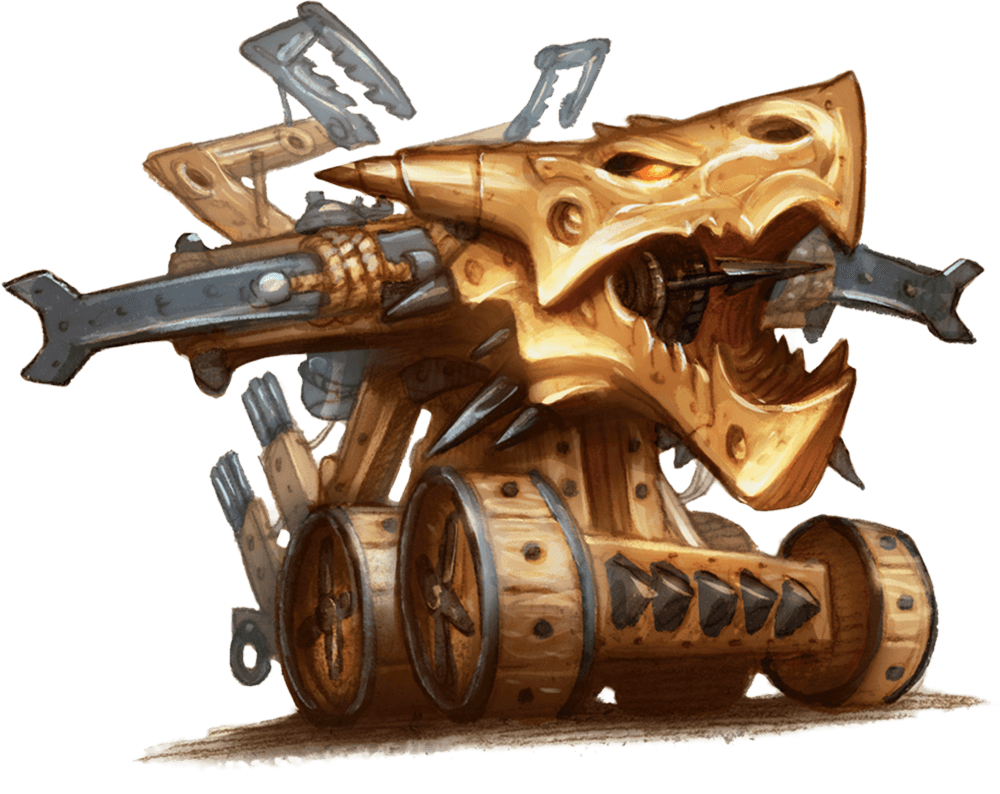Artillery Weapons
Weapons Table
The DMG describes each artillery weapon and its stats with a paragraph of text. The following properties were invented to express the same information in a simplified way. Below is a table of artillery weapons. The Small and Medium weapons were created specifically for this document while the Large and Huge weapons were taken directly from the DMG. No cost or weight was listed for these weapons.
Standard Artillery Weapons
| Name | Size | Cost | Damage | Weight | Properties |
|---|---|---|---|---|---|
| Heavy Crossbow* | Tiny Object | 50gp | 1d10 piercing | 18lb | Ammunition (range 100/400), Heavy, Loading, Two-handed |
| Light Ballista | Small Object | 150gp | 3d6 piercing |
40lb | Ammunition (range 100/400), Recoil, Loading (1), Two-handed |
| Scorpion | Medium Object | 300gp | 4d8 piercing |
150lb | Ammunition (range 200/800), Recoil, Loading (2), Two-handed |
| Small Cannon | 300gp | 4d10 bludgeoning | 100lb | Ammunition (range 300/600), Recoil, Loading (1), Aim (1), Siege, Cumbersome, Two-handed | |
| Full Ballista | Large AC 15 Hit Points: |
3d10 piercing | Ammunition (range 120/480), Stationary, Loading (1), Aim (1), Two-handed | ||
| Cannon | Large Object AC 19 Hit Points: 75 |
8d10 bludgeoning | Ammunition (range 600/2400), Stationary, Loading (1), Aim (1), Siege, Two-handed | ||
| Mangonel | Large Object AC 15 Hit Points: 100 |
5d10 bludgeoning | Ammunition (range 60/200/800), Stationary, Loading (2), |
||
| Trebuchet | Huge Object AC 15 |
8d10 bludgeoning | Ammunition (range 60/300/1200), Stationary, Loading (2), |
Siege Weapons with the siege property deal double damage to buildings.
Recoil Because of the recoil of this weapon, it must be Set into the ground or otherwise fixed to a vehicle or solid surface before it can be used properly. If not, any attack made from this weapon is at Disadvantage and no attacks can be made at Long Range. An action is required to Set the weapon into the ground. Once set, the weapon is able to freely rotate but each time it is moved by 5 or more ft it must be Set into the ground again. Outside of combat, weapons are assumed to Set into the ground when not moving. Weapons with the two-handed property require two hands to Set it into the ground.
Cumbersome Any weapon with the Cumbersome property usually has wheels attached. It is intended to be disassembled and reassembled on site. Both tasks take 10 mins. When traveling long distances while towing a fully assembled weapon along it is impossible to maintain a fast pace or to stay stealthy. All Strength and Dexterity checks related to moving are made at disadvantage if you are towing the fully assembled weapon (stealth to sneak past a guard, athletics to climb a tree, etc...).
Stationary Weapons with this property can freely rotate but cannot be moved more than 5ft without being completely disassembled and reassembled again.

Aim (1,2,3,etc…) The immobility of this weapon means that it needs to be Aimed at a specific target before it is Ready to fire. If the target moves by 5ft or more before the weapon can be fired, it must be aimed again. Weapons with the property Aim (1), Aim (2), etc… require the indicated number of separate Aiming actions before the weapon is Ready to fire. Weapons with the two-handed property require two hands to Aim.
Loading (0,1,2,3,etc…) Because of the complexity of this weapon, you can make only one attack with it when you use your Action, Bonus Action, or Reaction to fire it, regardless of the number of attacks you normally make. Weapons with the property Loading (1), Loading (2), etc… require the indicated number of separate Loading actions before the weapon is Ready to fire, though the ammunition need not be inserted until right before the weapon fires and can be done as part of the Attack action. Outside of combat, weapons are assumed to be Loaded unless otherwise stated. Weapons with the two-handed property require two hands to Load.
Range A weapon that can be used to make a ranged Attack has a range in parentheses after the Ammunition or thrown property. The range lists two numbers. The first is the weapon’s normal range in feet, and the second indicates the weapon’s long range. When attacking a target beyond normal range, you have disadvantage on the Attack roll. You can’t Attack a target beyond the weapon’s long range. If 3 numbers are listed, the first number is the weapons minimum range, the second indicates the weapons normal range, and the third is the weapons long range. No attacks can be made against targets closer than the minimum range.
Common Items
Bipod This set of two foldable legs can be attached to a Heavy Crossbow. It costs 10gp and weighs 2lb. When wielding a heavy crossbow with a bipod attached you can extend the legs and drop prone to have the weapon loose the Heavy property and gain the Recoil property. This effectively makes the heavy crossbow into an artillery weapon.
Ballista Bolt A set of 20 weighs 10lb and costs 5gp. This ammunition can be used for any Ballista.
Cannon Ball A set of 10 weighs 40lb and costs 10gp. This ammunition can be used for any Cannon.
Shrapnel Pretty much any bundle of junk with enough weight, at least 5lbs, can be considered shrapnel. This crude form of ammunition can be used by any cannon. When fired from a Small Cannon, each creature in a 15ft cone must make a DC 12 Dexterity saving throw or take 2d8 piercing damage. The range is extended to 30ft if fired from a Cannon.
Dragon Bolts
A set of 20 weighs 20lbs and costs 20gp. These ballista bolts have a chamber to contain black powder, and are used as ammunition only by Scorpions. Once fired, they become self-propelled midair.

Heavy Darts These tiny, roughly spherical objects are usually made of stone, clay, or glass, and weigh around 1 or 2lbs each. Their cost is negligible, no more than 5cp. They are an older more primitive form of ammunition which ballistae are still outfitted to use and is covered in ballista proficiency training. When a ballista is fired using this ammunition both the short and long range distances are halved. On a hit, the target takes 1d6 bludgeoning damage if fired from a Light Ballista, and 1d10 bludgeoning damage if fired from a Ballista.
Heavy Stone Mangonels and Trebuchets typically hurl these large rocks, although kinds of projectiles can be used, such as goblins or barrels of oil, with different effects.
Improvised Ammunition
As per the rules in the DMG, any object can be used as a weapon. If the object is similar to a weapon which the character has proficiency in (for example a leg of a table is akin to a club) then it can be treated as a that weapon. Otherwise it is an Improvised Weapon, dealing 1d4 damage, which you can only get proficiency with by taking the Tavern Brawler feat or by choosing it explicitly with the Weapon Master feat.
Heavy Darts were specifically created to be similar in size and weight to Flasks/Vials of useful substances: Acid, Alchemical Fire, Holy Water, Oil, etc... They are possibly also similar to a Bags of Caltrops or Ball Bearings or various small explosives. Throwing these objects is usually treated as attacking with an Improvised Weapon, but because these are similar to Heavy Darts, a character who is proficient in Ballistae can use them as ammunition! On a hit, these deal the damage of a Heavy Dart as well as their normal effect. This effectively gives players more versatility at the cost of expensive ammunition.
Additional Weapons

Exotic Artillery Weapons
| Name | Size | Cost | Damage | Weight | Properties |
|---|---|---|---|---|---|
| War Cart | Medium Object | 500gp | 1d8 piercing | 100lb | Ammunition (range 60/400), Loading (2), Cumbersome, Two-Handed, Burst Fire |
| Personal Ribald | Small Object | 700gp | 1d12 piercing |
80lb | Ammunition (range 40/120), Recoil, Loading (2), Two-Handed, Burst Fire |
| Torsion Sling | Small Object | 100gp | 1d8 bludgeoning |
60lb | Ammunition (range 30/120), Recoil, Two-handed, Special |
Burst Fire A weapon that has the burst fire property can make a normal single-target attack without having to load between each attack, or as an action it can make a Burst Fire attack, spraying a 10-foot-cube area within range with shots. Each creature in the area must succeed on a DC 15 Dexterity saving throw or take the weapon's normal damage. Creatures have advantage on the saving throw if the attack roll would normally be at disadvantage. This action uses ten pieces of ammunition. Once this action is used, the weapon must be fully Loaded before it can be used in this way again.
Special (Torsion Sling) As an action the Torsion Sling can fire a single piece of ammunition, dealing 1d8 bloudgeoning damage on a hit. Alternatively an action can be used to Load the Torsion Sling, which causes the next attack made with the Torsion Sling to deal an additional die of damage. This action can be repeated up to a maximum of 4d8 damage. Do to stress on the system, the Torsion Sling cannot remain Loaded for more than 1 minute at a time.
More Items
Bullets A set of 10 costs 3 gp and weighs 2 lbs. These are used as ammunition by fire arms and the Personal Ribald.
Black Powder - Gunpowder is chiefly used to propel a bullets out of the barrel of a pistol or rifle, or it is formed into a bomb. Gunpowder is sold in small wooden kegs and in waterresistant powder horns. Setting fire to a container full of gunpowder can cause it to explode, dealing fire damage to creatures within 10 feet of it (3d6 for a powder horn, 7d6 for a keg). A successful DC 12 Dexterity saving throw halves the damage. Setting fire to an ounce of gunpowder causes it to flare for 1 round, shedding bright light in a 30-foot radius and dim light for an additional 30 feet.
Rocket Arrows A set of 20 weighs 2lbs and costs 4gp. These arrows have device with black powder strapped to them. They are used as ammunition by War Carts. Firing these arrows from a regular bow is extremely uncommon and requires special proficiency in launching Rocket Arrows with Bows. When launched with a bow, increase the Long Range of the bow by 400ft.
Artillery Weapon Proficiency
Artillery weapons can be thought of as martial wepaons, or special weapons like guns or exotic/unusual weapons, or somewhere in-between. It's up to the DM to decide which characters are granted proficiency with these weapons. I recomend the following rule: All Fighters, Artillerist Artificiers, and Hexblade Warlocks are granted proficiency with artillery weapons, as well as any character who has both martial weapon proficiency and proficiency in a vehicle type (sea, land, or air). Remember that you can always take the Weapon Master feat to grant proficiency in up to 4 weapons of any type.
Weapons as Breakable Objects
Most weapons are Tiny Objects. As per the DMG objects have their AC determined by their material and their hit points determined by their size and whether they are fragile or resilient. Objects can also have damage thresholds and resistances, immunities, or vulnerabilities to various damage types.
Technically a non-magical Heavy Crossbow is a tiny object made out of wood. The DMG suggests that tiny objects made out of wood should have an AC of 15 and 1d4 or 2d4 hit points depending on how fragile or durable it is. The DMG offers even less guidance for magical objects. All it suggests is that magical objects have resistance to all damage. If a DM strictly sticks to these guidelines then players and NPCs would constantly be having their weapons destroyed.
This would probably result players very upset that 'you' keep breaking their crossbow every time they try to use it, or worse, that 'you' broke their brand new magical weapon. Clearly in practice the game is not played this way. Most DMs do not treat handheld weapons the same as other breakable objects.
Stationary weapons on the other hand are often treated as breakable objects because they deal tremendous damage, provide excellent cover, and are usually manned by minions. Because of this, the DMG provides AC and hit points for their stationary artillery weapons.
In the middle ground are the weapons with the Recoil property. Have a conversation with your DM or players about how often and in what circumstances these weapons can break. Can a Light Ballista survive a Fire Ball? Maybe just barely, but a Small Cannon is durable and probably takes more than just a Fire Ball to destroy it. If your group doesn't like these heuristics and wants hard numbers, then let me suggest the following: Light Ballista AC 15 with 25 Hit Points, Small Cannon AC 19 with 38 hit points. Once weapons are reinforced with Adamantine, their AC becomes 23.
For Players or NPCs?
Most people will think of artillery weapons only as a tool for the DM, and with good reason. Their large damage output is balanced out by often requiring multiple actions to use. This combined with their relative lack of mobility makes artillery weapons most associated with defending or sieging a building. This resource can be effectively used by DMs to create compelling encounters or balanced NPCs.
However there are situations a group might find themselves in where the players have access to artillery weapons. Consider the following scenarios:
The party has taken a ship from pirates and now has to defend themselves on the open waters. You want a balanced way to make the ship itself feel like a weapon. The bard's unseen servant helps man the artillery making them easier to use.
The Rouge asks the party Artificer if he can fashion her a ballista to help assassinate the Storm Giant king. When the plan inevitably falls apart the rouge alternates between their crossbow and the ballista which is magically cranking itself wound up.
The Warlock summons a small cannon that he and his specter franticly try to set up before the gnolls return. Meanwhile, the halfling ranger goes prone and takes cover behind the cannon while setting up the bipod to use their heavy crossbow.
If none of these scenes appeal to you, that's fine, maybe this is more geared for the DM than the players of your group. If they do, then this is for you.
Created by (u/Tim_the_Texan on Reddit)
Art Credit in order of appearance: OursBleuQc, Wizards of the Coast, Alex Horley-Orlandelli, kopakaseeker, Phyllostachys

Class Options
Battle Master Maneuvers
If you have access to maneuvers, the following maneuvers are added to the list of options available to you. Maneuvers are available to Battle Masters and to characters who have the Superior Technique fighting style or the Martial Adept feat.
Logistics
When you make a ranged weapon attack choose a willing creature you can see and hear that shares at least one language with you. For the purposes of this attack, your senses include the senses of your ally, possibly giving you line of sight or alerting you to the location of a hidden target. This attack ignores all cover (half, three-quarter, and full) that does not guard against an attack directly overhead. As normal, this attack is at advantage if the target cannot see you. If you hit, add the superiority die to the attack's damage roll.
Pinning Attack
When you hit a creature with a weapon attack, you can expend one superiority die to attempt to pin the target to a surface. You add the superiority die to the attack's damage roll, and if the target is Large or smaller, and if it is within 5ft of a solid surface such as a wall or the floor, it must make a Dexterity saving throw. On a failed save, the target's Speed becomes 0ft until the start of your next turn. The target or any creature within reach can use an action to end this effect early.
Artificer Infusions
Windup Shot
Item: A simple or martial weapon with the loading (0,1,2,etc...) property (requires attunment)
This magic weapon gains the (recharge 5-6) property. Once per turn, if the weapon is not loaded, you may roll a d6 (no action required). On a 5 or a 6, the weapon becomes loaded with a single piece of magical ammunition that it created. The ammunition created by this weapon vanishes the instant it hits or misses its target. At the 10th level this is replaced by the (recharge 4-6) property.
You can use this both infusion and the Repeating Shot infusion on the same weapon. The resulting item only uses one slot of attunment.
Warlock Invocations
Arcane Armory
Prerequisite: 5th level, Pact of the Blade
You can now keep a number of pact weapons equal to 1 + your Charisma modifier (min 2), though only one pact weapon may be out at a time. Any weapon you are proficient with can be made a pact weapon through the usual ritual. If there is a spell or effect that targets your pact weapon (e.g., Heat Metal, Holy Weapon, Hexblade's ability to use charisma for attack and damage rolls, etc...) it affects all of your pact weapons. On your turn you can choose to end any of these effects at will (no action required). In addition, you gain the following abilities:
- As a bonus action you can summon your pact weapon, exchange one pact weapon for a different one, or dismiss and resummon the same pact weapon;
- If your current pact weapon was magically created (not a magic weapon bound to you with a ritual), you can use your bonus action to transform it into any weapon you are proficient in;
- When summoning or resummoning a pact weapon that uses ammunition, you can Load your weapon and create a single piece of magical ammunition which disappears after being fired.
Rule Tip: (Loading) Summoning or resummoning a weapon with the Loading (0,1,2,...) property counts as taking the Loading action. This means a Light Ballista will be Ready to fire, while a Dragon Ballista still requires an additional action to Load.
Rule Tip: (Recoil) Summoned pact weapons appear in your hand, meaning weapons with the Recoil property do not come Set into the ground when summoned or resummoned.
DM Tip: (Stationary) You may want to disallow Pact Weapons from having the Stationary property, for obvious reasons.
Spells
Summon Arcane Operators
1st-level conjuration: Artificer, Bard, Wizard
Casting Time: 1 bonus action
Range: 60ft
Components: V, S, M (…)
Duration: Concentration, up to 1 hour
You call forth numerous arcane spirits. They manifest in a space you can see within range. These corporeal creatures use the Arcane Operators stat block. When you cast the spell you choose their appearance. The creatures disappear when the swarm drops to 0 hit points or when the spell ends.
These creatures are allies to you and your companions. In combat, they share your initiative count, but take their turn immediately after yours. These creatures cannot attack. Nor can they activate magical items which cause an attack roll or saving throw to be made. When you cast this spell, and on subsequent turns as a bonus action, you can issue verbal commands. If you don't issue any, they take the Dodge action and use their move to avoid danger.
These creatures share your proficiency in all skills and tools. Whenever they make an ability check they add your proficiency bonus as if you were the one making the check, adding double proficiency or half proficiency when appropriate. Outside of combat the Arcane Operators can be used to reduce the amount of time required to complete a crafting project. They count as a single collaborator if the required tool proficiency for the crafting project.
At Higher Levels. When you cast this spell using a spell slot of 2nd level or higher, use the higher level wherever the spell's level appears in the stat block. The duration also increases by 1 hour for each spell level above 1st.
Arcance Operators
Small swarm of Tiny constructs
- Armor Class 11 + level of the spell (natural armor)
- Hit Points 10 + 10 for each level of the spell above 1st
- Speed fly 20 ft. (hover)
STR DEX CON INT WIS CHA 10 (+0) 10 (+0) 10 (+0) 10 (+0) 10 (+0) 10 (+0)
- Skills Same as your own
- Damage Resistances Bludgeoning, Piercing, Slashing from non-magical sources
- Condition Immunities prone, grappled, restrained
- Senses darkvision 60 ft., passive Perception 12
- Languages understands the languages you speak
- Challenge -
Swarm. The swarm can occupy another creature's space and vice versa, and the swarm can move through any opening large enough for a Tiny creature. The swarm can't regain hit points or gain temporary hit points.
Actions
Distract. The Arcane Operators can distract a creature whose space they occupy. If the target is attacked before the end of your next turn, the first attack roll is made with Advantage.
Help. The Arcane Operators can aid a creature whose space they are occupying with the completion of a task. The creature you aid gains advantage on the next ability check it makes, provided you can add your proficiency bonus to this check and that the check is made before the end of your next turn.
Use an Object. The Arcane Operators can interact with an object which isn't being wore or carried and which is inside the space they occupy. They can drag this object as part of their movement if it weighs less than 100lb.
Fighter Archetype: Heavy Gunner
A Heavy Gunner can be the lone sentry on a tower wall defending their city against invasion, or can command a detachment of semi-mobile bombardiers preparing to siege. Some rush into battle marking targets for their crew to bombard from afar. While others stay back, lay traps, and use (relatively) smaller, lighter weapons to turn the tide of battle.
Bonus Proficiencies
At the 3rd level your study of artillery weapons grants you proficiency with Tinkering tools or Smith tools. You also gain proficiency in all Artillery weapons if for whatever reason you did not already have it. An Artillery weapon is any ranged weapon that is required to be mounted on a vehicle or fixed to a surface to use. These are weapons with the Stationary or Recoil properties and include most of the Siege weapons from the DMG (p. 255) and a few weapons created to make this subclass more enjoyable. All Artillery weapons are listed in a table earlier in this document.
Bombardier
By the 3rd level your practice with artillery weapons has aided you greatly. When making a ranged weapon attack with an Artillery weapon, you can use your Dexterity or Intelligence modifier to determine your bonus to hit and damage. You can add the bonus to damage even if the weapon damage normally doesn't include a bonus. If the artillery weapon instead requires the target to make a saving throw, you can use your Heavy Gunner DC ( 8 + intelligence mod + proficiency bonus) instead. If you know any Battle Master Maneuvers that require saving throws, you can instead use your Heavy Gunner DC provided that an artillery weapon was used during the maneuver.
When you take the Attack action, you can use each of your attacks to Set, Load, Aim, or Fire an artillery weapon. You can also ignore the loading property for crossbows and firearms if they are relatively common in your world.
Quick Gunner
At the 3rd level, you learn how to effect objects at a distance. Through your skill and careful planning, you can use your Bonus Action to take the Use an Object action, interacting with an object within 30 ft. of you. This may be whipping a rope around to open a door, knocking a healing potion over to spill into the gullet of a downed ally, or having that second bolt fall right into place on a crossbow. When you interact in this way with a Crossbow, Firearm, or Artillery weapon which is ready to fire, you can cause it to make a ranged weapon attack against a target using your intelligence modifier for attack and damage.
You can use this feature twice per Short or Long Rest. When you reach the 7th, 10th, 15th, and 18th levels in this class you gain one additional use of this ability per Short or Long Rest.
DM Note: The Quick Gunner ability is supposed to feel and role play like the character set up the perfect plan before battle, but it shouldn't actually require any preparation from the player. This becomes even more important after they gain the Gunner's Instincts feature.
Allow your player to flavor their use of the Quick Gunner ability to make it feel that their character was ready for anything. For example, allow them to change "As a Reaction to the Vampire moving, I have my Light Ballista rotate and fire a Silvered Ballista Bolt at it" to "Now that I can see the Vampire is directly in the line of fire, I use my Reaction to kick a stone at my Light Ballista, setting off the hairpin trigger and causing a Silvered Ballista Bolt to fire at the Vampire."
Gunner's Instincts
At the 7th level, your instincts have honed enough to mitigated some common disadvantages gunners often face.
When a creatures makes an attack against you with advantage, you can use your reaction to make a single melee weapon attack against them. You may draw a melee weapon as part of this attack. You ignore any disadvantage you would have on this attack.
When there is a ranged attack against a target you can see within reach, you can use your Reaction to give advantage to the ranged attack.
Lastly, when any creature within 30ft of you moves or makes an attack, you can use your Reaction to use your Quick Gunner ability.









Reinforced Weaponry
At the 7th level, you learn how to best use and protect your expensive weaponry.
You can spend 4 hours and 25gp worth of silver to add silver tips to 10 pieces of non-magical ammunition or one non-magical melee weapon. Ammunition and weapons that are silvered in this way are considered magical for the purposes of overcoming resistance and immunity.
You can spend 4 hours and 25gp worth of adamantine to strengthen the weak points of 10 pieces of non-magical ammunition or one non-magical weapon. Ammunition and weapons that are fortified in this way are considered magical for the purpose of durability and resisting damage. They are immune to effects which damage non-magical items (such as an Ooze's Corrode Metal feature). If treated as breakable objects, they now have an AC of 23 and resistance against all damage.
DM Note: The official rules offer little clarity to the special durability of magic items. In practice you should treat an adamantine reinforced Light Ballista the same as a magical Longbow. To save your players' money you may rule that artillery ammunition is already sturdy and usually doesn't break unless it is being used as a siege weapon.
Battery Training
By the 10th level, your experience with artillery weapons has taught you how to prepare them quickly. You now only need 1 free hand to Set, Load, or Aim a firearm, crossbow or artillery weapon with the two-handed property. In addiction, you can attempt to ready your weapon as a bonus action by succeeding on a DC 10 Intelligence check to Set the weapon, a DC 10 Strength check to Load the weapon, or a DC 10 Dexterity check to Aim the weapon. Attempting to load a crossbow or firearm requires no ability check.
You can also pass along this benefit to allies by spending 30 mins (which can be done during a short or long rest) instructing a number of creatures equal to 1 + your intelligence modifier (minimum 2) on how to rapidly ready your weapons. Each creature you chose (having a minimum intelligence of 6) gains the full benefit of your Battery Training feature until the end of their next long rest. If a creature receives this benefit 3 times in a week, the benefit lasts for 1 month.
At the 15th level, creatures you instruct can add half their proficiency bonus to the ability checks, or their entire proficiency bonus if they have proficiency in that artillery weapon. You no longer need to make the ability checks and automatically succeed each time.
Overloaded
At the 15th level, your experiments with artillery weapons allows you to safely push them past their limits. When you use an Action to load an artillery weapon, crossbow, or firearm you can overload it by placing 3 pieces of ammunition instead of one. When this weapon is fired, it makes three ranged weapon attacks at the same target, each attack suffers a -5 penalty to hit. A weapon can benefit from this property even if you aren't the one to fire it.
Focus Fire
At the 18th level you are a master of commanding artillery strikes. Once per Short or Long Rest, when you use your Quick Gunner ability you can cause any number of loaded firearms, crossbows, and artillery weapons within 30ft of you to fire at once. You can also allow any number of creatures within 30ft to use their Reaction to make a single ranged weapon attack. All of these attacks must be against the same target.